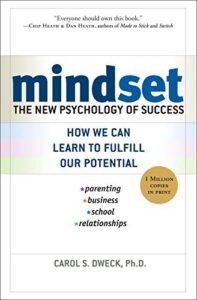“MINDSET” by Carol S. Dweck, Ph.D
 I always had a problem with intelligence because, in my first grade, the teacher said that only boys are intelligent. The girls are nerds who study all the time. And because of this, girls are sometimes better than boys.
I always had a problem with intelligence because, in my first grade, the teacher said that only boys are intelligent. The girls are nerds who study all the time. And because of this, girls are sometimes better than boys.
For me, the internalization of these statements from my beloved and admired teacher was to study and work all the time for all the things I wanted to learn or do.
Looking back, almost 50 years later, I realize that my first teacher did me a favor by making me develop my accomplishments, which put me in the category of growth mindset.
It was Carole S. Dweck, a psychology professor at Stanford University, that taught me about fixed mindset and growth mindset:
“What are the consequences of thinking that your intelligence or personality is something you can develop, as opposed to something that is a fixed, deep-seated trait?
The growth mindset is based on the belief that your basic qualities are things you can cultivate through your efforts, your strategies, and help from others.”
Parents should learn to praise their children not for their intelligence but for their effort in pursuing a task or studying for an exam.
“Yes, children love praise. And they especially love to be praised for their intelligence and talent.
It really does give them a boost, a special glow—but only for the moment.
The minute they hit a snag, their confidence goes out the window and their motivation hits rock bottom.
If success means they’re smart, then failure means they’re dumb.
That’s the fixed mindset.”
This is the best gift the parents can give to their children:
“Parents think they can hand children permanent confidence—like a gift—by praising their brains and talent.
It doesn’t work, and in fact has the opposite effect. It makes children doubt themselves as soon as anything is hard or anything goes wrong.
If parents want to give their children a gift, the best thing they can do is to teach their children to love challenges, be intrigued by mistakes, enjoy effort, seek new strategies, and keep on learning. That way, their children don’t have to be slaves of praise.
They will have a lifelong way to build and repair their own confidence.”
Kindle, 2022



Recent Comments